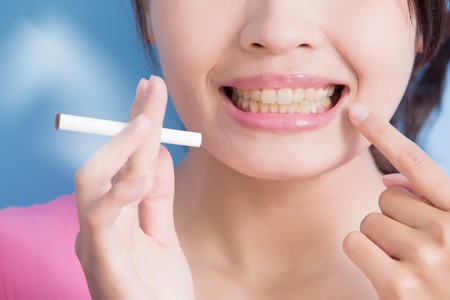Over 37 million Americans smoke, according to the Centers for Disease Control. That’s about 15% of the population. While many of these smokers have likely heard that smoking is bad for their health, they may not realize smoking can also cause oral health issues, too.
What Does Smoking Do to Your Teeth?
Smoking tobacco can harm Hendricks County residents’ teeth in many ways, such as causing:
- Tooth Discoloration. Tar and nicotine contained in tobacco can stick to the enamel of your teeth, causing them to become stained over time. Many smokers have teeth that have yellowed or turned brown due to tobacco use. While teeth whitening treatments can help slow down this staining process, they can’t reverse tobacco’s staining effects if you continue to smoke.
- Bad Breath. Tar and nicotine particles can adhere to your teeth, gums, tongue, inner cheeks, and lungs for hours, causing your breath to smell bad for hours after your last cigarette. Additionally, over time, smoking can reduce your ability to make saliva. Inadequate saliva production can lead to an overgrowth of bacteria in your mouth, which causes halitosis. Mouthwashes may provide a short-term solution to bad breath, but they can’t cure it.
- Gum Disease. Smokers are two times more likely to have gum disease than nonsmokers. Smoking weakens your body’s immune system, making it harder to fight off bacteria and infection while interfering with your ability to heal. Your weakened immune system enables plaque-causing bacteria to build up on your teeth. As the plaque hardens, your gums can pull away from your teeth. This process causes the bones and tissues that hold your teeth in place to weaken and break down, known as periodontitis. Eventually, your teeth may fall out or need to be extracted. Because of tobacco’s effect on healing, gum disease treatments aren’t as effective for smokers.
- Delayed Healing. Not only can smoking increase Hendricks County residents’ risk of needing tooth extractions or oral surgery, since it can weaken your immune system, you won’t be able to recover from these procedures as quickly as you should. Additionally, it makes you more prone to developing further oral complications. While Dr. Jon Erickson at Danville Family Dentistry can help to lessen any potential problems from oral procedures as much as possible, your treatment plan can only be so effective if you continue to smoke.
- Oral Cancer. Smoking can increase your risk of developing oral cancer. One of the first signs of oral cancer is a white or red patch in your mouth that makes it difficult to chew or swallow. Other signs include numbness in your jaw and pain in your ear. If you have these symptoms for more than two weeks, you should see your doctor. Early detection of oral cancer can result in more effective treatment. If you’re a smoker, make sure you have annual oral cancer screenings.
The Best Solution to Prevent Oral Health Problems
If you’re experiencing any of the above oral health issues, contact Danville Family Dentistry to schedule an oral exam at our Hendricks County office. While Dr. Erickson can develop a treatment plan to address these concerns, the best solution is to stop smoking. Talk to Dr. Erickson or your doctor to determine what medications are available to help your quit smoking. Not only will you have better oral health after you stop smoking, you’ll also have a healthier life for years to come.
Disclaimer: The information included in this article is for educational purposes only. It should not be used as a substitute for professional medical advice, diagnosis or treatment.


 (317) 745-4400
(317) 745-4400 info@danvilledentalcare.com
info@danvilledentalcare.com